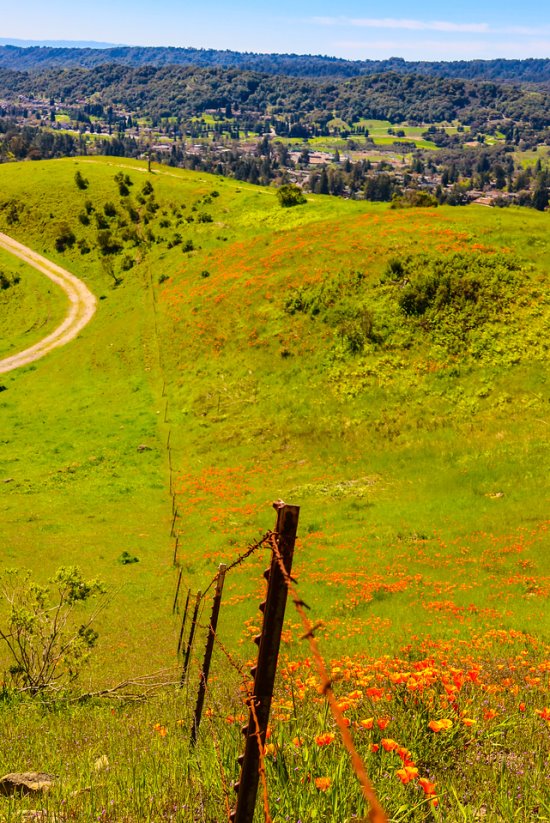
| ||||||
Julie Rossiter, one of the affected homeowners, told the council, both in person and in written comments, that she opposed the proposal to allow cattle grazing in the open space. "Doing so is directly contrary to the restrictions placed on the open space in the grant dead donating the property to the city," she said, "which requires the property to be retained as `parkland' and used for open space, recreational, and natural resource conservation purposes." Leasing the property to a rancher for profit to the city, Rossiter alleged, is contrary to the explicit intent of the grant deed. Glenn Rudebusch submitted photos to the council showing a spring super bloom on the Orinda land. Rudebusch stated that the Moraga parkland that abuts Orinda Oaks has been "denuded of California natives."
Jim and Linda Landau, residents of nearby Hall Drive, provided historic background about how the land came to be acquired for Orinda. In a letter submitted to the council, they explained how cattle were grazed on the land back in the 1980s, and how they were concerned that there would eventually be a fatal traffic incident involving cattle that managed to wander onto the nearby roads. When a property developer became interested in acquiring the land for building, the Landaus explained that Steve Arnon, an environmentalist who lived adjacent to the park, discovered that there was a little-known law that provided that any piece of land of at least 100 acres, located completely within city limits and adjacent to an existing city park, had to be offered to the city for purchase before a bid could be accepted by a private purchaser.
However, when the then city council refused to put up the $600,000 purchase price for the 111 acres, Arnon organized a fundraising effort that eventually funded the purchase price. Caroline Mills, president of the Orinda Parks and Recreation Foundation, confirmed that they had raised the $600,000 to repay the city for the purchase of the land. She, as did other speakers, pointed out that the Orinda land, without cattle grazing, has not suffered from the same landslides as has the Moraga land that is grazed by cattle.
The Landaus supported the view that those who worked so hard to fund the purchase did so because they valued the natural, native quality of the land. They advocated for mechanical mowing twice a year or goat grazing in early summer followed by end-of-summer mechanical cutting. "Fuel mitigation is absolutely essential, but we believe that either other option to be preferable to the reintroduction of cattle grazing," they concluded.
The staff report on the item was presented by City Manager David Biggs. He referred to a 2021 survey, and reported that goat grazing was preferred by the public but that cattle grazing was considered more economically viable. In written public comments Kevin Cross pointed out that the survey, owing to a typographical error, overstated the cost of goat grazing by a factor of 10, listing the 25-year cost at over $22 million instead of a little over $2 million.
During the following council discussion, council member Brandyn Iverson remarked that "this was the most informative public comment period I have ever experienced." She added, "When immediate neighbors speak passionately, we listen. Cattle grazing should be off the table."
Mayor Inga Miller agreed, adding, "There is more at stake here than costs." With the agreement of council members Janet Riley and Latika Malkani, there was unanimous consent that cattle grazing should not be considered for the park and open space. Biggs said that the city will do mechanical cutting this year and see if they can hire goats for grazing in 2024.
Reach the reporter at:
